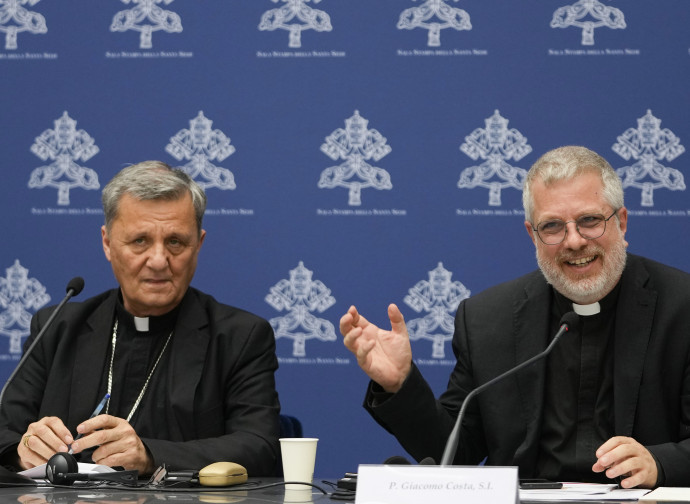Instrumentum Laboris, torture by words prepares October Synod
Amidst rehashed slogans and hardly credible declarations of intent, the Instrumentum Laboris gives the impression that the last session of the synodal path is of little interest to the faithful. And perhaps also to the Pope.

The press conference presenting the Instrumentum Laboris for the October Synod is an official candidate to take away from the European Football Championship in Germany the record of the most boring event of summer 2024. To be a bit impertinent, an hour and twenty minutes of conference and thirty pages of document could be summed up as torture by words.
The headline passages, in the end, are always the same: more transparency on money and sexual abuse, less clericalism, more space for women and laity. The Instrumentum Laboris states that "the demand for transparency and accountability in and by the Church has arisen as a result of the loss of credibility due to financial scandals and especially sexual and other abuses of minors and vulnerable persons".
The problem, however, is that these declarations of intent are hardly credible if one considers the recent cases of Monsignor Alberto Perlasca and Father Marko Rupnik. The former has been rehabilitated as a deputy promoter of justice at the Supreme Tribunal of the Apostolic Signatura and was not tried in the Vatican trial arising from the London palace scandal despite the fact that at the time of the events he held the position of head of the administrative office of the First Section of the Secretariat of State; the latter was expelled from the Society of Jesus after the public denunciation by some former nuns, considered highly credible by the Jesuits, but was then almost immediately incardinated as a priest in the diocese of Koper. The Slovenian mosaicist was first revoked (it is not yet known by whom) the excommunication for "absolution of the accomplice in confession", then he was spared the waiver of the statute of limitations for denunciations dating back thirty years. Finally, after the uprising of public opinion and the harsh stance taken by the Pontifical Commission for the Protection of Minors, the dispensation was triggered, which allowed an investigation to be launched at the Dicastery for the Doctrine of the Faith, about which, however, almost a year later, nothing is known.
Reading through the pages of the Instrumentum Laboris, among the problematic passages, is the request that "adequately trained lay faithful, men and women, may also contribute to the preaching of the Word of God during the celebration of the Eucharist. In some cases, lay faithful, men or women, may also be extraordinary ministers of Baptism'. Who knows if at least the laity, if 'some local Churches' are satisfied, will respect the timing on homilies recently given by Francis: no more than eight minutes.
Another thorny topic is that of the female diaconate. The document states that it will not be discussed in October because "while some local Churches ask that women be admitted to the diaconal ministry, others reiterate their opposition. On this issue, which will not be the subject of the work of the Second Session, it is good that theological reflection should continue, with adequate time and modalities" adding that "the fruits of Study Group No. 5, which will take into consideration the results of the two Commissions that have dealt with the issue in the past, will contribute to its maturation".
The most discussed issue, as we know, was taken off the synod fathers’ table last February after a chirograph in which the Pope ordered the establishment of specific study groups. Francis, in fact, had explained in a letter to Cardinal Mario Grech, Secretary General of the Synod Secretariat, that he had chosen this option in order to ensure that such delicate theological issues would be tackled "according to an authentically synodal method" while in the October session it would not have been possible, according to the Pope, to guarantee an in-depth study. Thus, on the one hand the indication to address these issues - in which that of the female diaconate is included - with an authentically synodal method, and on the other hand the decision to remove their discussion from the work of the Synod itself.
In any case, what we seem to understand is that the last session of this synodal journey that began in 2021 with quite different expectations (and fears) will not produce much of a decisive (or, in other respects, a shocking) outcome. At most, it will still give the stage to the Synod's general rapporteur, Cardinal Jean-Claude Hollerich, to giggle in a press conference, still thinking he will cause surprise or astonishment if he says he is "very sinful".
The truth, said half-heartedly by several synod fathers, is that this Synod has no appeal among the faithful, it speaks from the outset a 'bureaucratic' language that would require an ad hoc Instrumentum Laboris just to orient itself between diocesan phase, continental phase, universal phase, study groups, etc., etc., etc. The impression, moreover, is that the Pontiff himself is a bit fed up with the "toy" and is leaving Hollerich and Grech to deal with it, well aware that in the end - as the Luxembourg Cardinal said in the conference - it will be him alone who will decide.
